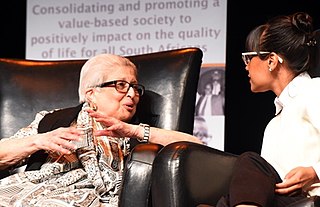| |||||
| Decades: | |||||
|---|---|---|---|---|---|
| See also: | |||||
The following lists events that happened during 1996 in South Africa.
| |||||
| Decades: | |||||
|---|---|---|---|---|---|
| See also: | |||||
The following lists events that happened during 1996 in South Africa.
The Cabinet, together with the President and the Deputy President, forms part of the Executive.
Bafana Bafana wins African Cup of Nation that was organized in South Africa by winning 2–0 against Tunisia in the final.

The Inkatha Freedom Party is a conservative political party in South Africa, which is a part of the current South African government of national unity together with the African National Congress (ANC). Although registered as a national party, it has had only minor electoral success outside its home province of KwaZulu-Natal. Mangosuthu Buthelezi, who served as chief minister of KwaZulu during the Apartheid period, founded the party in 1975 and led it until 2019. He was succeeded as party president in 2019 by Velenkosini Hlabisa.

Prince Mangosuthu Gatsha Buthelezi was a South African politician and Zulu prince who served as the traditional prime minister to the Zulu royal family from 1954 until his death in 2023. He was appointed to this post by King Bhekuzulu, the son of King Solomon kaDinuzulu, a brother to Buthelezi's mother Princess Magogo kaDinuzulu.

The Constitutional Court of South Africa is the supreme constitutional court established by the Constitution of South Africa, and is the apex court in the South African judicial system, with general jurisdiction.
The following lists events that happened during 1999 in South Africa.
The following lists events that happened during 1997 in South Africa.
The following lists events that happened during 1995 in South Africa.
1994 in South Africa saw the transition from South Africa's National Party government who had ruled the country since 1948 and had advocated the apartheid system for most of its history, to the African National Congress (ANC) who had been outlawed in South Africa since the 1950s for its opposition to apartheid. The ANC won a majority in the first multiracial election held under universal suffrage. Previously, only white people were allowed to vote. There were some incidents of violence in the Bantustans leading up to the elections as some leaders of the Bantusans opposed participation in the elections, while other citizens wanted to vote and become part of South Africa. There were also bombings aimed at both the African National Congress and the National Party and politically-motivated murders of leaders of the opposing ANC and Inkatha Freedom Party (IFP).

The following lists events that happened during 2002 in South Africa.
The following lists events that happened during 2003 in South Africa.
The following lists events that happened during 2001 in South Africa.
The following lists events that happened during 2005 in South Africa.
The following events happened in South Africa in the year 1998.

Frene Noshir Ginwala was a South African journalist and politician who was the first speaker of the National Assembly of South Africa from 1994 to 2004. She was influential in the writing of the Constitution of South Africa and an important figure in establishing democracy in South Africa.

Nozizwe Charlotte Madlala-Routledge is a South African politician who was South Africa's Deputy Minister of Defence from 1999 to April 2004 and Deputy Minister of Health from April 2004 to August 2007. President Thabo Mbeki dismissed her from the Cabinet on 8 August 2007, after which she maintained her role as a member of parliament representing the African National Congress. On 25 September 2008, she became Deputy Speaker of the National Assembly, serving in that capacity until resigning from Parliament in early May 2009. She has been a member of the South African Communist Party since 1984.
The 52nd National Conference of the African National Congress (ANC) was held in Polokwane, Limpopo, from 16 to 20 December 2007. At the conference, Jacob Zuma and his supporters were elected to the party's top leadership and National Executive Committee (NEC), dealing a significant defeat to national President Thabo Mbeki, who had sought a third term in the ANC presidency. The conference was a precursor to the general election of 2009, which the ANC was extremely likely to win and which did indeed lead to Zuma's ascension to the presidency of South Africa. Mbeki was prohibited from serving a third term as national President but, if re-elected ANC President, could likely have leveraged that office to select his successor.
Thembile Lewis Skweyiya was a South African lawyer and judge who served on the Constitutional Court of South Africa between February 2004 and May 2014. He rose to prominence as a civil rights lawyer during apartheid and he served three years in the KwaZulu-Natal High Court before his elevation to the Constitutional Court.

Pius Nkonzo LangaSCOB was Chief Justice of South Africa from June 2005 to October 2009. Formerly a human rights lawyer, he was appointed as a puisne judge of the Constitutional Court of South Africa upon its inception in 1995. He was the Deputy Chief Justice of South Africa from November 2001 until May 2005, when President Thabo Mbeki elevated him to the Chief Justiceship. He was South Africa's first black African Chief Justice.
The Thirteenth Amendment of the Constitution of South Africa re-enacted provisions of the Twelfth Amendment which the Constitutional Court ruled had not been validly enacted. These provisions transferred the Matatiele Local Municipality from KwaZulu-Natal province to the Eastern Cape province.
Lionel Percival Hercules Mbeki Mtshali was a South African politician who was Premier of KwaZulu-Natal from 1999 to 2004. He was known for unilaterally ordering the expansion of the province's antiretrovirals programme during the HIV/AIDS epidemic, in defiance of the policy of the national government under President Thabo Mbeki. A founding member and former chairperson of the Inkatha Freedom Party, Mtshali was also national Minister of Arts, Culture, Science and Technology in the government of President Nelson Mandela from 1996 to 1999.